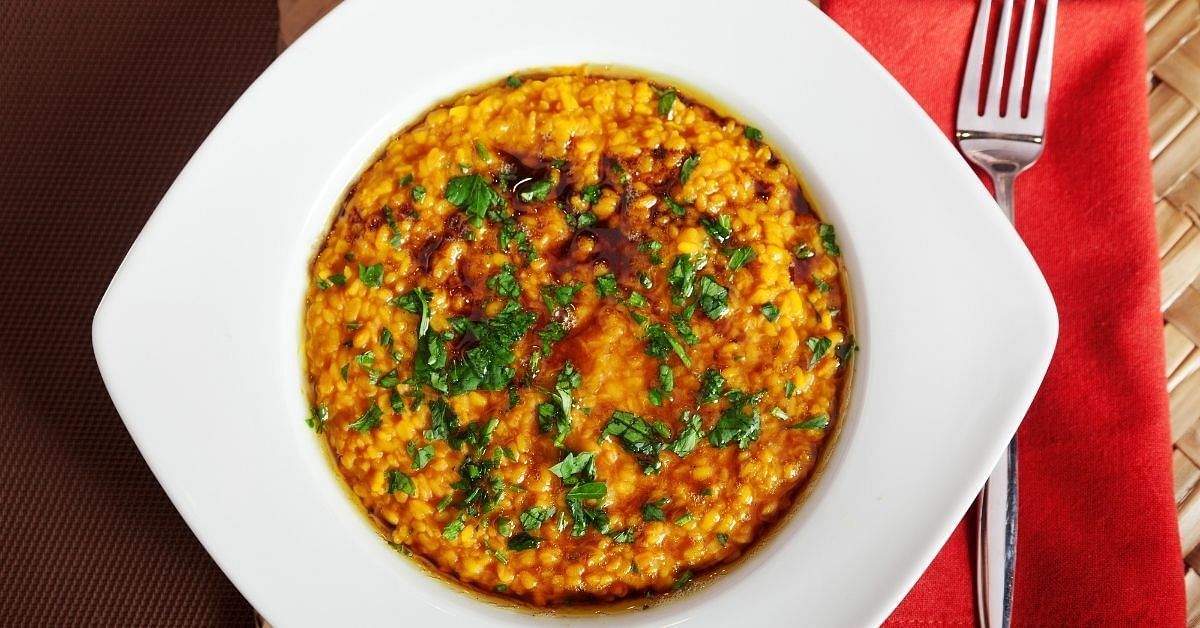13 Amazing Moong Dal Benefits That Will Make You Eat It Everyday!

While searching for healthier foods to add to your diet, you might have come across suggestions for moong dal. These legumes have been cultivated since ancient times. They are native to India but spread to other parts of Southeast Asia. Many dishes can be made from this healthy Indian comfort food.
What Is Moong Dal?
Moong dal, alternatively called mung beans, starts as small green beans. Once they are split, it becomes yellow moong dal. Mung beans are green with the skin on and yellow without the skin. There are many yellow moong dal benefits, making it a staple in Indian homes. It is a great source of protein for vegetarians. Green gram benefits are more when they are consumed sprouted.
Nutrients in Moong Dal
There are tons of nutrients in moong dal. They are rich in vitamins and minerals. It is best to have sprouted green grams.
One cup of boiled mung beans contains the following nutrients:
- Calories: 212
- Fat: 0.8 grams
- Protein: 14.2 grams
- Carbs: 38.7 grams
- Fibre: 15.4 grams
They further have Vitamins B (B1, B2, B3, B5, B6, B9), Manganese, Magnesium, Iron, Phosphorus, Potassium, Copper, and Zinc. Green gram is also rich in selenium and essential amino acids, which the body is incapable of making itself.
They have a different nutritional composition when they are sprouted; they have fewer calories, more free amino acids, and antioxidants.
Sprouting also helps to lessen phytic acid levels, an antinutrient. This is important because antinutrients reduce the absorption power of minerals such as zinc, magnesium and calcium.
Moong Dal Benefits
Since there are many moong dal benefits, people choose to eat it regularly. Some of the best moong dal health benefits include:
1. Good for Eyes
Yellow moong dal benefits include high levels of zinc. Zinc in green gram helps in managing night blindness. It activates an enzyme in our body which aids in producing Vitamin A. This vitamin is key in treating night blindness.
2. Aids in Weight Loss
Green gram for weight loss is considered great since it is low in fat and rich in proteins and fibre. It keeps you full for a longer time and curbs your cravings. Moreover, it can detoxify your body, boost your metabolism and immune system.
3. Lowers Cholesterol Levels
Green gram can lower high cholesterol levels in the blood system. It helps in softening of arteries and veins. Moreover, it regulates blood pressure.
4. Controls Blood Sugar Level
Green moong can help keep the body's energy balanced. Green Moong, being rich in fibre, is full of complex carbohydrates, which helps in stabilising blood sugar.
5. Has Antibacterial Properties
Green Moong is packed with B Vitamins. It is vital to eat foods with Vitamin B6 as it helps you strengthen your resistance against bacteria and other disease-causing agents. Moong beans contain the antioxidants vitexin and isovitexin, which help defend cells against free radicals.
6. High Antioxidant Levels Reduce Risk of Chronic Disease
Green gram contains healthy antioxidants, such as phenolic acids, flavonoids, caffeic acid, and cinnamic acid. Antioxidants are crucial in neutralising potentially harmful molecules called free radicals. Sprouted contains more antioxidants than regular moong beans.
7. Prevents Heat Stroke
Moong bean soup is a great way to stay hydrated. It is common to drink moong bean soup during hot summer days in many Asian countries. This is because moong beans have anti-inflammatory properties that help fight heat stroke, high body temperatures, and more.
8. May Lower “Bad” LDL Cholesterol Levels
If you wonder, “Is moong dal good for health?” it is! High cholesterol, specifically bad cholesterol, increases the risk of heart disease. Moong beans have high fibre, protein and antioxidant properties that lower LDL cholesterol.
9. Good For Digestive Health
Moong dal is rich in soluble fibre called pectin, which is great for your gut and helps maintain regular bowel movements. It helps speed up the movement of food through your digestive tract. One cup of moong beans contains 15.4 g of fibre.
Moong beans have resistant starch. Similar to soluble fibre, resistant starch helps to nourish your healthy gut bacteria. The bacteria convert it into short-chain fatty acids (particularly butyrate). Butyrate is great for digestive health. It nourishes your colon cells, improves your gut’s immune defences, and helps you fight off colon cancer risks.
10. Contains Good Carbohydrates
Our bodies also require carbohydrates. The type of carbs found in moong beans happens to be easy to digest compared to those found in other legumes. Green gram is less likely to cause gas and bloating.
11. Supports a Healthy Pregnancy
When a woman is pregnant, she is advised to eat plenty of folate-rich foods. This is because folate is vital to the optimal growth and development of the child. Moong beans happen to be a great source of folate.
They also contain high levels of iron, protein, and fibre, important requirements during pregnancy. Pregnant women should not eat raw moong bean sprouts for the risk of infection.
12. Easy to Add to Your Diet
Moong beans are versatile and are easy to add to your diet. Moreover, they are palatable and nutritious. You can add them to salads, soups, and curries. One of the green gram benefits is that they are slightly sweet and are often used in Asian desserts as a paste.
They can be boiled or steamed. They can be eaten sprouted, raw, and cooked. You can even add them to stir-fries and curries.
13. Rich Source of Protein
They are rich in protein, which is essential for forming new cells, building strong bones, haemoglobin, and repairing cells. When you mix moong beans with cereals, it increases the quality of protein.
Also Read: Best DHT Blocker Foods That Work to Fight Hair Loss
How to Sprout Moong Bean?
Sprouted moong dal is a great source of nutrition, with low moong dal calories. If you are wondering how to make moong dal, here are some tips for sprouting moong dal properly:
- Look for good quality seeds for sprouting.
- Clean the moong beans by washing them. Then soak them overnight. Even 7-8 hours will do. Ensure that the beans are properly submerged in the water.
- On the next day, rinse the beans and drain out the water.
- You will find that the seed is swollen and plump. Some of them may have even sprouted a little.
- Fully drain all the water.
- Take a thin cotton cloth and wet it. Ensure that all excess water has been fully squeezed out.
- Take the moong beans and put them in the cloth. Then hang it loosely so that the remaining water can drain.
- Once the water drains, put the cloth along with the moong beans in a vessel. Ensure you keep it at room temperature.
- Cover the pot with a lid and do not disturb it. Keep it overnight.
- The fabric must remain damp. There should be no excess water in the vessel.
- By the third day, the seeds would have sprouted well.
- You can then refrigerate the sprouts for a few days and eat them later.
How To Make Moong Dal?
If you do not want to sprout your moong dal and you are wondering how to make moong dal, here are some alternative options. Both options are easy to make and taste yummy.
- Moong Dal Tadka: Cook the dal in a pressure cooker or a pan. Stir fry onions, tomatoes, green chillies, ginger, and garlic. You can then add cumin, dry red chillies, and mustard seeds. Finally, add in herbs like curry leaves or coriander. All of these need to be fried in oil or ghee. Once this hot oil mixture is ready, you can add it to the cooked dal.
- Moong Dal Fry: The first step of dal fry is cooking the dal in a pressure cooker or a pan. Then you saute some onions, tomatoes, herbs, and spices in some ghee or oil. Once you finish this saute, add in the cooked dal. You then keep it on simmer for some time.
Summing Up on Moong Dal Benefits
There are many yellow moong dal benefits. Green gram is one of the best things you can add to your diet. From being rich in protein to decreasing your risk of infection, it is a superfood.
FAQs
In case you still have some questions regarding moong dal, read on:
1) Is Moong Dal Good for Health?
Yes, moong beans are nutritionally balanced. They are great for your health as they are rich in vitamins, minerals, and beneficial enzymes.
2) Does Moong Dal Increase Fat?
No, it does not. It is good to eat green gram for weight loss. Since it is rich in protein and fibre, it helps suppress hunger hormones and keeps you feeling satiated.
3) Does Moong Dal Cause Gas?
Yes, moong dal may cause gas. This is especially true for people suffering from irritable bowel syndrome. This is because of the presence of certain sugars called alpha-galactosides, which are found in most beans. They belong to a group of carbs that may escape digestion and get fermented in the colon by gut bacteria. The symptoms include flatulence, cramping, bloating, or diarrhoea. If you are not experiencing irritable bowel syndrome, then you can have moong dal on a daily basis; just make sure you eat in moderation.
4) Is It Good to Eat Moong Dal Every Day?
Yes, you can eat moong dal every day. Just ensure you eat it in moderation. Moong dal is rich in iron and can counter anaemia. Overall, including moong dal into your diet can boost your immune system and prevent you from contracting diseases.

